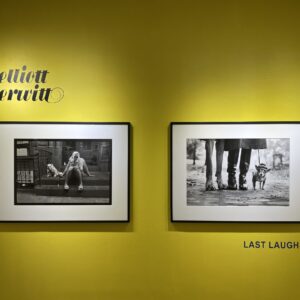JTF (just the facts): Published in 2013 by Phree (here) and Editorial RM (here). Stapled softcover, 112 pages, with 57 color photographs. Includes an essay by the artist (in both English and Spanish), a fake advertisement (back cover), and a political cartoon. (Spread shots below.)
Comments/Context: A lot of ink has been spilled of late about the recent flowering of photoboook publishing, and if Carlos Spottorno’s The Pigs is any indication, innovations in form and execution are rapidly becoming much more complex and sophisticated. Spottorno’s book isn’t really a book, it’s a magazine – in fact, it’s a dead ringer parody of The Economist, right down to the red box logo, the back cover ad for the fictional WTF Bank, an interleaved political cartoon, and the flimsy thin paper. While a book of photographs about the European financial crisis might seem potentially dull, in Spottorno’s hands, the plight of Portugal, Italy, Greece and Spain (or PIGS in the financial press acronym form) becomes something more complicated, his pitch perfect satire forcing us to see how the photographic stereotypes of the press have helped to construct a certain kind of narrative.
Nearly every image in this collection is built on a contrast or juxtaposition: new/old, history/modernity, decay/transformation, local/tourist, always opting for the most negative visual interplay. The cradle of Western Civilization is now decorated with burnt cars, half built apartments, overflowing garbage, and people sleeping in the streets. The images have a constant undercurrent of mismatch, perceptions of former glory clashing with the ugliness of the current realities. Flea markets pop up at the foot of the Acropolis, fancy stainless steel turnstiles guard a deserted archeological site, and the tired Chic Market is anything but. His images are a parade of dumpster diving, gypsy beggars, falling down hotels, and endless graffiti, set against the haughty dress uniforms of the Italian police or the toppled over stone columns of antiquity. They are exactly the kind of images we might expect to find in The Economist, metaphorically illustrating a dry discussion of debts, deficits, unemployment, or an exit from the Euro zone.
What gives this book its kick is that it is at once a biting parody and a sadly truthful document. The economic plight of these countries is creating real cultural challenges that are manifesting themselves in distressing ways, and Spottorno has artfully pointed his camera at many of them. It’s his layer of purposeful exaggeration, of realizing that these are the kind of images we are accustomed to seeing (and are now expecting) that makes the book more insightful and rich. It calls into question an entire genre of received wisdom and reminds us how photography is constantly being used to shape perception, both positively and negatively. In the end, The Pigs is an incisive contemporary commentary, a photobook whose deft construction and presentation meaningfully enliven the photographs inside.
Collector’s POV: I was unable to discover any gallery representation for Carlos Spottorno, so interested collectors should likely follow up directly with the artist (via the site linked in the sidebar) or with the two publishers.
















